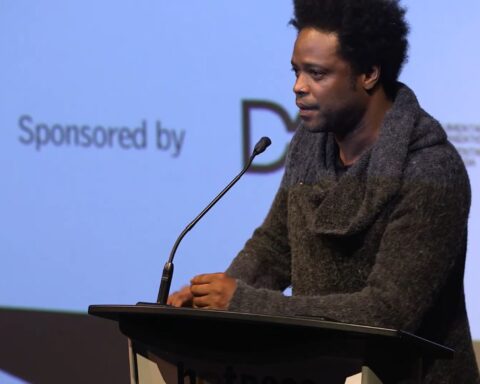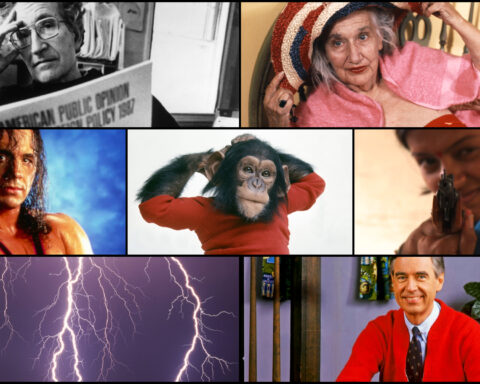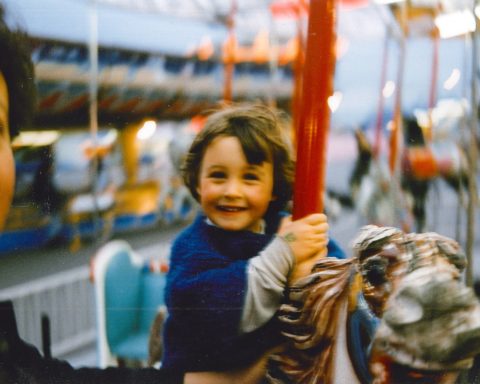“We are now, have always been, and always will be, at war. It is a war for human minds, and their active will. Independent thinkers, documentary filmmakers and digital media artists are the foot soldiers of this media war. We should attempt to pour our work and activism into the forge of human service. Let us become our own masters, re-appropriate our media away from conglomerates, consumption and mass-mind colonizers. Let us “robin hoodwink” them, transforming our documentary artwork into real media for the masses.”
From Peter Wintonick’s Doc the World: My personal manifesto and credo, published in POV, 2007
***
I MET PETER THROUGH HIS FILMS, before our paths crossed in real life, though maybe Peter would have said that films are real and our mortal lives an elaborate make-believe. Either way, I’m glad to have met him on both levels of existence.
It was the beginning of the new century and Tito Cabellos and I were trying to make a documentary in the Andes mountains without quite knowing HOW, and learning, often painfully, as we went along. The film was our first and we were young, nervous parents. We set out with a lot of heart, borrowed equipment and the naïve idea that it would take six months to make a feature film.
A friend said it sounded like we were trying to do Direct Cinema or ‘Cinéma Vérité’ and we should check out a new film produced by the National Film Board of Canada (NFB).
Somehow we got our hands on an NFB catalogue and found Cinéma Vérité: Defining the Moment, directed by Peter, which had been released in 1999. A month later, a shiny new VHS tape arrived at our home/ office in the mountains of Peru, via my parents’ volunteer mailing service in Oshawa, and we embarked on a 102-minute crash-course in reality-based film-making.
We discovered there was a method to this madness of documentaries, or, rather, a vibrant, spontaneous, continually evolving method. Peter laid it out for us with incredible archive footage, engaging interviews and what we would come to know as a distinctive Peter-ish humour: subtle, often biting and self-deprecating and deeply political.
“It’s like we’ve been trying to write a novel without having read the classics,” said Tito in awe after our first viewing of Cinéma Vérité.
In film terms, we were desperately illiterate. This was before renegade doc lovers inundated Peru’s black market with pirated DVDs of the world’s best non-fiction films. So Cinéma Vérité was a nugget of gold that dropped from the sky and we watched it again and again, until the poor VHS tape moaned and wheezed from over-use.
Inspired, we asked my parents to send tapes with works by some of the film greats Peter had travelled around the world to interview: the Maysles brothers, Barbara Kopple, Donn Pennebaker and Robert Drew.
Nearly three gruelling years later we released our film and managed to land a spot at IDFA. It was our first encounter with the doc film industry, and fate, or the stars, or the guardian angel of struggling indie film makers threw Peter Wintonick our way again—this time in the flesh. Peter became one of our key guides to the festival and the crazy world of distribution, along with the editor of POV Magazine.
In the midst of the high-stakes schmoozing, chaos and glamour in Amsterdam, I was struck by Peter’s humility and genuine interest in helping us.
Peter had his own film at the festival, Seeing is Believing, but somehow in between business meetings, film screenings, giving a masters class, media interviews and watching several films a day, he introduced us to everyone we needed to know and helped us devise a blueprint for our film’s distribution, which we still use over a decade later.
We weren’t the only ones to benefit from his tutelage. Every day at breakfast, while the rest of us nursed hangovers and jet lag with coffee and vitamin C, Peter was in high gear, holding court with aspiring young filmmakers at one of the restaurant tables at our IDFA hotel on a curving Amsterdam street.
He was a favourite with filmmakers who were supported by the Jan Vrijman Fund (now the IDFA Bertha Fund); those of us from Latin America, Asia, Africa and the former Soviet Bloc. Most of us made our films without support from broadcasters or government funds, scraping together shoe-string budgets, facing censorship, repression and worse in our home countries, and without any idea of how to get our films shown afterward.
The fund paid our way to the festival, which was our entry into the frenetic, confusing and often painful world of film production and distribution. And Peter was our guide, navigating the way with an odd mix of Zen-like calm and bubbling enthusiasm.
Peter had many roles and personas on the international scene: director, producer, mentor, writer, comic foil and Philosopher King. He was also part of a quasi-Holy Trinity, ‘The Three Canadian Peters of Doc Film’, along with Peter Mettler (Petropolis, The End of Time) and Peter Lynch (Project Grizzly and Cyberman). That year at IDFA, Wintonick and Lynch teamed up to give a double-Peter master class on the power of the digital revolution.
Peter drew from his film Seeing is Believing: Handicams, Human Rights and the News, co-directed with Katerina Cizek, to illustrate the value of citizen filmmaking. He introduced us to the Witness program, which provides equipment and training to activists living in isolated and dangerous areas, so they can document human-rights abuses.
Tito and I had done media advocacy training with the activists and villagers who appeared in our film, helping them with press releases and conferences, and using the film as a platform for their struggle. But we’d balked at the idea of putting video cameras into their hands. What was the point in generating poorly filmed footage? Wasn’t filmmaking best left in the hands of professionals?
Peter convinced us we were wrong. Handicams gave power to the people, allowing a new-media revolution. It didn’t matter if the footage was often shaky or out-of-focus with sound trouble. These were life and death situations: violence in the Philippines, abuses by Slobodan Milosovic’s forces during his reign in former Yugoslavia, the brutal police beating of Rodney King, an African American in Los Angeles, that sparked race riots. If citizen cameras hadn’t captured these events, the rest of the world would have remained blind.
We headed back home to Peru with a new plan: we translated parts of the Witness manual into Spanish and started a video training program with communities embroiled in conflicts with foreign mining companies. Soon we joined forces with DocuPeru, an association of young Peruvian filmmakers who started an annual ‘Documentary Caravan’, travelling to some of the country’s most remote and forgotten areas and teaching locals to make their own short documentaries. Whenever we ran into Peter, we’d give him a progress report and he’d get excited and offer to come down and help out at a ‘Caravan’. It was one of those dream projects we kept putting off until it was too late; one of life’s regrets.
Something momentous did happen, though. One of the mining activist groups we helped train became the focus of a spy operation; a private security firm was following, photographing and filming their every move. The activists, armed with their own camera, developed a counter-espionage plan, filming the spies and ultimately capturing one of their agents, along with hundreds of the spy firm’s reports, photos and video footage.
It was any filmmaker’s fantasy—explosive material, a decade’s worth of our own archival footage and exclusive access. Peter become our mentor on the project, workshopping our script and rushes at an IDFA summer school.
By then Tito and I were in the middle of a divorce, which complicated our co-director relationship just a tad, and the film was in danger of falling into a lengthy custody battle. Peter did some gentle but firm slapping around. He made us come up for air and realize that the film—the real-life protagonists and struggle—were more important than our petty infighting.
The film’s themes were close to Peter’s heart. He plucked them out of our jumbled script and suddenly the story became clear: powerful corporations usurping democracy and national governments; the privatization of espionage, a faith-based hero along the lines of Romero, Mandela and Martin Luther King, Jr., and the battle between Mother Nature and industrialized greed.
Peter offered to continue helping as a voluntary editorial consultant. He knew our budget wasn’t enough to make an infomercial in Canada, so he told us not to worry about paying him (but “Shhhh,” don’t let anyone know he was free labour. Sorry, Peter—your secret is out).
It was an incredible show of generosity from a man who had zero free time and dozens of projects on the go, yet Peter was insistent and nonchalant, as though he gave his services for free all the time… which, it turns out, he did.
Peter watched rough cuts, met with me on Skype and sent comments by e-mail from far-flung corners of the globe.
It wasn’t always sunshine and roses having Peter on board. Other consultants might have taken the easy route, patted us on the head and said, “It’s good enough for a Peruvian film.”
Peter didn’t lower his standards or fall into patronizing racism.
He gave honest criticism and that could be frustrating, especially when we were a few days before the IDFA submission deadline and an e-mail from Peter came saying: “I think [the film] needs another month of hard round-the-clock post work,” followed by a depressingly long and detailed list of suggested changes.
I stomped about the editing room a bit.
Uttered a few choice words.
Stomped around some more.
Then I calmed down and realized Peter was right.
When you’ve been editing for a year with material that spans a decade, you reach a point where you just want it to be over. Peter convinced us to take a deep breath—have a beer, or a few—and spend some extra months polishing the film.
He was wise and caring enough to speak the truth and in doing so, he helped filmmakers go deeper, reach further, and come out with a much stronger movie.
When The Devil Operation finally opened at Hot Docs, a dream premiere, Peter was there. As we stood in the dark aisle of the sold-out theatre watching the final credits role, I thanked Peter for his help, from couple’s-counselling through the financing and editing down to his final tough-love critique.
He shrugged his enormous shoulders and said, “I just think you have to do what’s best for the film,” and then he added, quietly, “It’s a good film.” Which meant a lot.
Hot Docs had brought the film’s protagonist to the opening, a remarkable Peruvian priest who was standing up to one of the world’s largest gold mining companies, despite spies, death threats and the assassination of a close friend and ally.
At the end of the film, the crowd gave Father Marco a standing ovation, and after listening to the priest’s intense, heartfelt Q&A, Peter drew me aside and said, “Bring Father Marco with you whenever you show the film. I don’t know how you’ll do it—pack him in your suitcase or something. But bring him. He’s incredible.”
Peter knew the strength of connecting a film’s protagonists with audiences, of bridging the gap between cultures and continents. And he always stressed the importance of grassroots distribution, of bringing the film back to the affected communities, of connecting with activists in North America and Europe, of making the film the way we wanted and not worrying about time slots and broadcaster requirements.
At Hot Docs, Peter once more fit me into his impossible schedule, connecting me with distributors, broadcasters, filmmakers and activists. I’d be standing lost in the middle of a cocktail hour, remembering that I’d left Canada before becoming an adult (and wondering if and when I would ever grow up), when Peter would appear like magic. He’d have a slightly flustered look, which I think came from the strain of mastering the feat of being in several physical locations at the same time.
Without preamble he’d blurt out: “Have you met XYZ yet?”
I’d start to shake my head in a ‘no’ and we’d be off, with Peter steering me through the crowd, deftly swiping us drinks from a waiter’s tray and presenting me, with a flourish, to the person I needed to meet. Once he’d made the introductions and chatted a bit, he’d be off again, moving his large frame with super-human speed through the crowded squash of movers and shakers.
He stole the show at the Hot Docs pitching forum that year, hamming it up as a boxing promoter to present director Yung Chang’s China Heavyweight, about young amateur Chinese boxers.
“I should make a film about you making a film,” I said to him after the pitch.
“I think it’s already been done,” he quipped with perfect, deadpan comic timing. If Peter had wanted to appear on camera, he could have made it in Hollywood. But frivolity wasn’t his style.
No one could do a film festival like Peter. I’ve met up with him at IDFA several times, Hot Docs and even in Prague, at One World, and it’s always the same: Peter everywhere at once, bounding about with almost child-like glee, meeting everyone, and more impressively, remembering all their films and stories. When the mid-festival blues set in and most filmmakers plunge into existential depression (Why am I here? Am I accomplishing anything? Where are the free drinks and why do I always seem to miss them?), Peter was still a fountain of optimism.
He quite simply loved the world of documentary filmmaking, with a serious, honest and unfaltering passion.
A typical day at any festival: bump into Peter at 7 AM and receive his “picks of the day”—a list of films you absolutely must see, running back to back until midnight; he leaves you pondering how to fit it all in without collapsing from lack of food and water, and rushes off to participate in a panel discussion about green filmmaking; afterward see Peter huddled in a corner with a broadcaster; at lunch time he’s having a quick bite with an activist filmmaker from Nigeria (or Cambodia or Ecuador); during the afternoon he flits from meetings with producers, broadcasters and distributors, stopping to have coffee with a Brazilian filmmaker interested in mobile cinema projects. Then it’s cocktail hour and Peter is throwing everyone together who needs to meet. Before the drinks are gone, Peter is off and running to a screening, and then a string of parties until the wee hours of the morning.
Peter’s party skills are legendary. But he never stopped working; he was lucid at 3 AM, comparing indigenous struggles against gold mining in the Andes to Shakespeare’s Richard II, telling me about his favourite Herzog films, quoting Noam Chomsky and debating the pros and cons of pitching forums versus crowd funding (Peter would have said to do it all).
When did he eat or, more importantly, sleep? Probably not until the festival was over…and then only for a few days before he got back to filming, writing and producing, and off to the next festival.
Thank you, Peter, for your films, your guidance and your tremendous heart. You more than earned your place as an icon of Canadian documentary and an international guru, supporting filmmakers and festivals around the world, in some of the most oppressed and censored places, where you were needed most. You were a model of your own ‘film local, think global’ mantra, and little bits of Peter can be found in documentaries from Asia to Africa to Latin America, Europe, North America and everywhere else in between.
You will be missed, but not forgotten.











